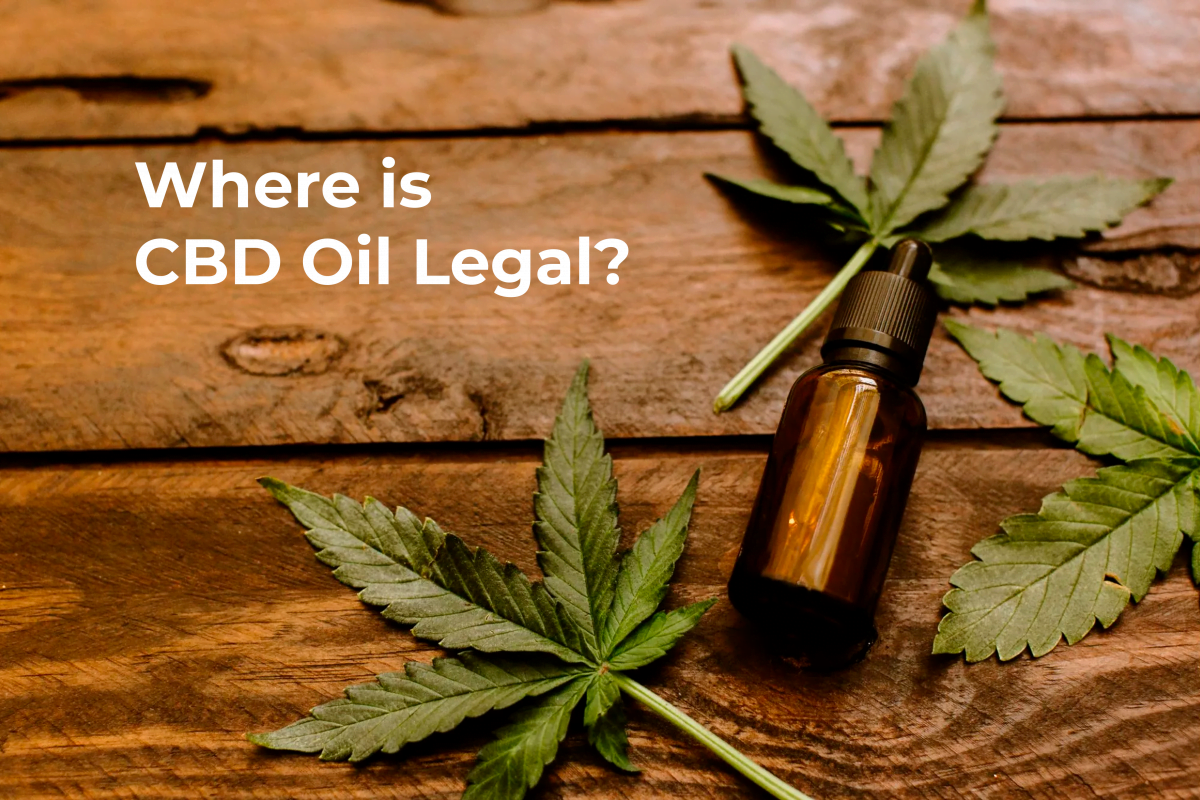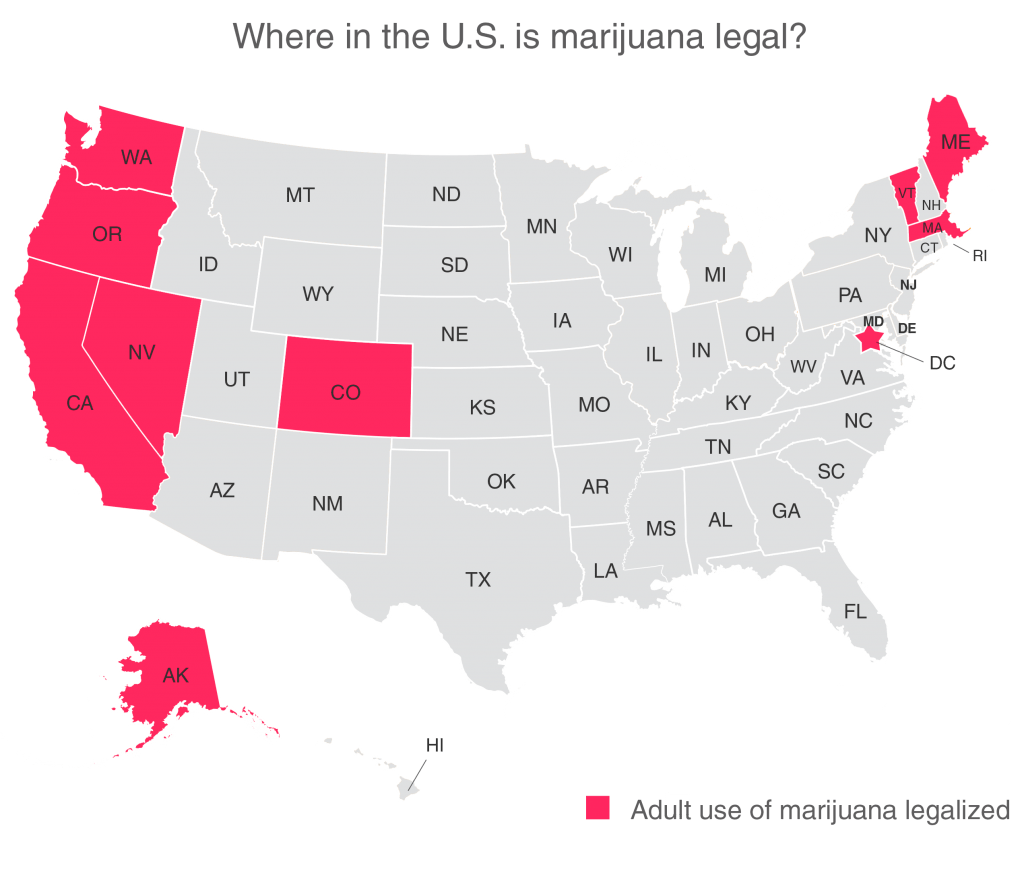Where is CBD Oil Legal?

In December of 2018, the president signed the Agriculture Improvement Act of 2018, more commonly known as the Farm Bill. [1]
While this bill addresses a number of issues within the agricultural realm—some of which include international food aid, farm credits, and crop insurance—one that dramatically affected the way we as a nation now utilize cannabidiol (CBD) products was the legalization of industrial hemp under federal law.
Yes, the United States Drug Enforcement Administration (DEA) does still classify marijuana as a schedule 1 drug under the Controlled Substances Act, but the Farm Bill also changes the legal status of industrial hemp on a federal level. [2]
To better understand exactly what this means, it’s important to realize that, although industrial hemp does come from the cannabis plant, in order for it to be classified as hemp, it cannot contain more than 0.3 percent tetrahydrocannabinol, or THC.
The marijuana plant contains a number of cannabinoids, but THC is the one most people are concerned about since it is also the one that has psychoactive effects. That said, with hemp products only having a maximum of 0.3 percent THC, they do not create the high that is commonly associated with medical marijuana and other types of cannabis sativa products.
Now that the legal status of industrial hemp has changed, it would seem like common sense that CBD products adhering to the 0.3 percent restriction on THC content would also be legal. However, all of the laws involving hemp plants are not quite so clear. This leaves many consumers to wonder: Is CBD legal?
One of the issues that makes answering the question about CBD legalization so difficult is that, while the federal government has spoken on this issue, the Farm Bill allows individual states to devise their own plans for growing and cultivating industrial hemp. [3]
This means that there is no standardization among the states themselves, making CBD legal in some areas of the country and illegal in others based on the individual state’s current cannabis laws.
Another reason the legality of CBD is so confusing is due to the Farm Bill only legalizing cannabinoids that are extracted from hemp plants grown according to the specifications within the bill itself. If they’re not, these cannabinoids are still classified as a schedule 1 drug, thus making them illegal to use and possess.
So, how do you know whether CBD is legal in the state that you reside? This requires knowing your state’s current laws regarding the medicinal and recreational use of marijuana.
Admittedly, the cannabis laws in individual states are constantly changing. Therefore, while the intent of this list is to educate users about the legality of CBD in their particular states, it is always advised that you check your state’s current laws to know for sure whether you can legally use CBD products such as CBD oils and tinctures.
That said, as of September 19, 2019, the states that have legalized both recreational marijuana and medical marijuana (which refers to the use of marijuana for medical conditions) are [4]:
- Alaska
- California
- Colorado
- Maine
- Massachusetts
- Michigan
- Nevada
- Oregon
- Vermont
- Washington
- Washington D.C.
Additionally, the states that have legalized marijuana for medical use only, therefore mandating that users obtain a medical marijuana card before being able to purchase and consume any type of cannabis products are:
- Arizona
- Arkansas
- Connecticut
- Delaware
- Florida
- Hawaii
- Illinois
- Louisiana
- Maryland
- Minnesota
- Missouri
- Montana
- New Hampshire
- New Jersey
- New Mexico
- New York
- North Dakota
- Ohio
- Oklahoma
- Pennsylvania
- Rhode Island
- Utah
- West Virginia
Three states have made cannabis products illegal under all circumstances, and they are:
- Idaho
- Nebraska
- South Dakota
All of the remaining states have their own unique laws that ultimately determine under which circumstances CBD oil is legal and when it is not. These states include:
- Alabama
- Georgia
- Indiana
- Iowa
- Kansas
- Kentucky
- Mississippi
- North Carolina
- South Carolina
- Tennessee
- Texas
- Virginia
- Wisconsin
- Wyoming
For example, in Texas, you can use CBD products containing 10 percent CBD and a maximum of 0.5 percent THC only if you are an intractable epilepsy patient, which means that typical epileptic medicines have little to no effect on controlling your seizures.
And if you live in Kansas, you can use CBD products if you’d like, regardless of whether you have a medical need, but they cannot contain any THC whatsoever.
So, is CBD oil legal in your state? DISA Global Solutions offers links to all of the state’s marijuana laws, making it easier than ever to find out.
Sources:
[1] “H.R.2 – Agriculture Improvement Act of 2018.” Congress.gov. Accessed Sep 19, 2019. https://www.congress.gov/bill/115th-congress/house-bill/2
[2] “Drug Scheduling.” DEA.gov. Accessed Sep 19, 2019. https://www.dea.gov/drug-scheduling
[3] Hudak, J. “The Farm Bill, Hemp Legalization and the Status of CBD: An Explainer.” Brookings. Dec 14, 2018. https://www.brookings.edu/blog/fixgov/2018/12/14/the-farm-bill-hemp-and-cbd-explainer/
[4] “CBD Legal States 2019.” World Population Review. Accessed Sep 19, 2019. http://worldpopulationreview.com/states/cbd-legal-states/

Founded in 2018, Spruce produces American-made, premium-quality, highly potent
CBD products.
Spruce Natural Labs
1053 E. Whitaker Mill Rd.
Suite 115-H
Raleigh, NC 27604, USA


SHOP
PAGES
CONTACT US
© 2022, Spruce Natural Labs LLC.
This product is not for use by or sale to persons under the age of 18. This product should be used only as directed on the label. It should not be used if you are pregnant or nursing. Consult with a physician before use if you have a serious medical condition or use prescription medications. A Doctor's advice should be sought before using Spruce. All trademarks and copyrights are property of their respective owners and are not affiliated with nor do they endorse this product. These statements have not been evaluated by the FDA. This product is not intended to diagnose, treat, cure or prevent any disease. Individual results will vary. By using this site, you agree to follow the Privacy Policy and all Terms & Conditions printed on this site. Void Where Prohibited by Law.




